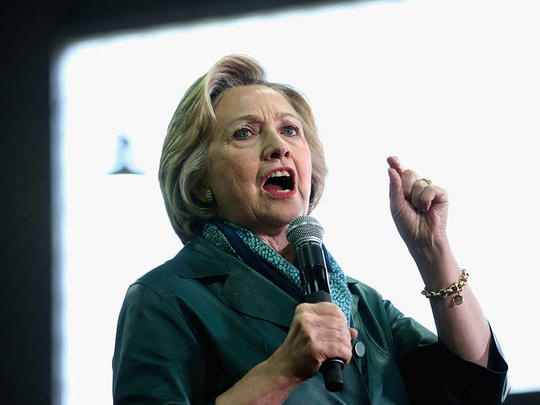
To announce you’re excited about Hillary Clinton is an oddly subversive act, and to suggest others ought to feel the same, even more so.
But following a decisive victory in New York and with her path to the presidency ever-more surefooted, the possibility of the first female US president is sinking in. And whatever your feelings about Clinton as the vessel for this achievement, it’s an extraordinary one. Even Clinton herself will acknowledge she doesn’t have the magnetism of certain politicians, telling feminist writer Lena Dunham memorably of her candidacy, “If you can’t get excited, be pragmatic”.
Clinton’s bid for president may not have the dreaminess of Barack Obama’s, but it’s on track to be every bit as historic. And to simply say she would be the first female commander-in-chief is almost too glib. Should she actually win in November, she’ll have overcome a political process that, until Obama, systematically kept everyone but white men from the presidency for the last 220-plus years. If young Democrats, who champion inclusivity in politics, can’t start getting excited about upending that centuries-old tradition, they — to quote a popular internet meme — are doing it wrong.
Ellen Malcolm, the founder of Emily’s List, which campaigns to get pro-choice Democratic women elected, thinks it’s just a matter of time until even the Bernie holdouts come around. “I think electing the first woman president is going to unleash a sense of emotion and pride from women across this country and from across the world,” she told MSNBC earlier this year. As someone who’s been dealing with the question “Why should I vote for someone because she’s a woman?” for the last 30 years, she should know.
Shattering the glass ceiling twice
Another exciting plot twist came last week when Clinton’s campaign chairman, John Podesta, announced that his boss is currently mulling a number of women on her VP list. It’s a move that, if realised, would shatter the glass ceiling not once, but twice. Yet that it comes as such a surprise that Clinton has multiple qualified women she’s considering underscores how far from representative government the US is. There are just three Democratic women governors Clinton might choose from. Women, though they make up more than half of the population, hold just 104 of 535 seats in Congress, and for minority women the numbers are considerably worse. There have been just two women of colour elected to the Senate — ever — and only one black woman in the history of the institution: Carol Moseley Braun in 1992.
That Veep talk has turned so quickly to progressive favourite Elizabeth Warren, who still hasn’t even endorsed Clinton, is evidence mostly of a shallow bench. Many of Clinton’s feminist detractors will tell you they want a woman president, just not this woman. But if not this woman, which woman, and how long are they willing to wait? Even those who can’t appreciate the symbolism of the first woman president, can surely appreciate the political victories of a candidate who’s spent her life fighting for women’s rights. And Clinton has, from leading on developments of the Paycheck Fairness Act to carving out a name for herself around paid family leave, and from working at the Children’s Defence Fund early in her career to speaking up for abortion access and minority rights on the campaign trail.
More, her lived experience means she sees the world differently than her white male counterparts and when it comes to sexism, she sees more. She has a visceral understanding of discrimination, an understanding that’s coloured by her experience as someone who’s endured it herself, in politics and in media and in life, for decades and at times to an excruciating degree. Frankly, it’s a miracle she still wants to run for public office.
This election she’s made women’s issues central to her campaign to a degree she didn’t dare back in 2008 but even now she deploys the message somewhat sparingly: “Sometimes, it is choices between people none of whom excite you, but study it enough to figure out. OK, if I vote for this person over that person, I’m more likely to see progress on something I care about,” she told an audience of female fans at a campaign stop in New Hampshire.
In case you missed it, that’s code for she’ll put women’s rights (read: human rights) at the centre of her presidency. And that should excite you whether you’re a man or a woman, or just a sentient creature with a heart.
— Guardian News & Media Ltd
Lucia Graves is a Guardian US columnist. She was previously a staff correspondent for National Journal magazine and a staff reporter at Huffington Post.







